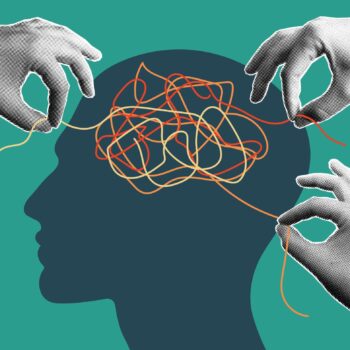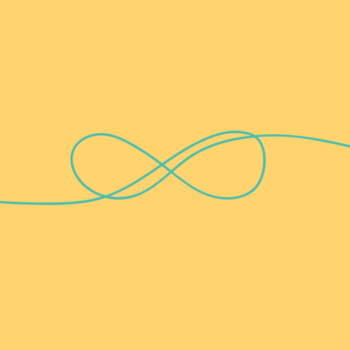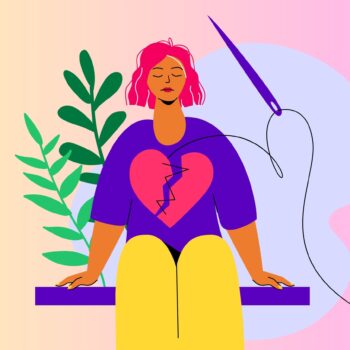Nonfinite Grief (Grieving The Life You Expected)
/ General : Litsa Williams
The What's Your Grief Podcast: grief support for those who like to listen.

In this grief podcast, Eleanor Haley, MS and Litsa Williams, MA, LCSW-C, the mental health professionals behind the website and book 'What's Your Grief', leave no stone unturned in demystifying the complicated and messy world of living life after loss. One digestible topic at a time, Haley and Williams distill topics ranging from grief theory to coping. Grief is sad and confusing, but your grief support doesn't have to be. You can listen here by using the player above or listen and subscribe wherever you get your podcasts.
Below we have provided a transcript of the episode.
Hey everyone. Welcome back to another episode of the What's Your Grief Podcast. This is Eleanor and I'm joined by Litsa. Litsa, how are you?
I'm doing all right. My week has been okay. It started off a little rough but on the upswing, you know I think the probably the highlight was that I took part in this meeting with some other grief experts. You know, it was a sort of a brainstorming meeting. um And I wasn't necessarily looking forward to it particularly. But it actually ended up being nice. And interesting for a lot of reasons. But one of the things it really had me thinking about, that we don't talk a lot about because obviously we're not connected particular, you know, with a faith community or where, you know, we don't do a lot of work necessarily directly, though we do certainly have a lot of people who do Faith Community Grief Support who use our resources, but I've been thinking a lot about this just how equipped are faith communities to support people who are grieving. And it came up in this meeting yesterday, as something that I think there are some people in the field who are really working on trying to improve this. And it (it) really dovetailed well since last week in our grief professionals community, we had our book club and the author of this new book, which was our book club pick, she joined us and she has this book called Faith Doesn't Erase Grief and that book really tackles the topic for people who are grieving, who are struggling with this idea that maybe their (their) faith communities or other people in their lives who are religious are using religion to kind of tell them Oh no, you don't need to be grieving, you know, you should be celebrating that your loved one is in heaven now and that (that) should sort of ease some of your pain. And her book, which is directed towards grievers, I think, does a really great job of trying to look at how you can have incredibly deep faith and still be grieving deeply, and how your faith can be shaken, and that that's okay and you can navigate that. um And doing that in a thoughtful and supportive way. But also, it was nice to see some people thinking about how do we strategize to help church and other faith communities not say things that are so minimizing. Or provide grief support that maybe addresses some of the things that we know about grief from a real mental health perspective rather than simply maybe that sort of spiritual or biblical perspective. And yeah. I think that's just been really nice to see, it's kind of been a highlight of my week. Knowing that there are people that are thinking about this and working on it and (and) really trying to create something that will help people who are grieving.
Yeah. I agree. I think that book club discussion was great. And it's (it's) obviously a very important topic. Like many other experiences with people in grief, your faith community, it follows some similar patterns, you turn to them for help and support in times of hardship and quite often they're really good at responding to that. But just like with a lot of people, they don't have necessarily training on how to support people in grief. They don't always know the right thing to say and we certainly have heard stories about people feeling like their faith communities tried to bypass their pain a little bit and focus on (on) the spiritual elements of Oh you'll see them again. And you know, people who have faith don't need to grieve and we know that's not true. um So, I do think that that can be, it's really good to know that there are resources being developed just to help everybody be a little bit better. And what we do know is that a person's faith can be an incredible resource, an important part of their framework and an incredible tool when they're grieving. But it's also just like, again, a lot of other things that are really significant and important to us and that we value in life, one of the things that can be really shaken after experiencing loss and um requires a little bit of reconciling um at times. So, it is good to know that there are new resources out there. And if you have a resource, know a resource, want to share a resource, please do with us. um Because we're always looking to make sure we have catalogs and libraries of resources that we can help refer people to for their particular needs.
So, um I also, Litsa, you wrote kind of a long form article for us on What's Your Grief this week. I feel like it's been a while since we've done a more long form explainer type of article and it, it's on a topic that, it's one of those topics that is really odd that we didn't cover, like in the first couple years here at What's Your Grief, for ever, for whatever reason, we just kept not addressing it. And so finally, you wrote an article on it. And it's a topic, I think is really important. And so, I (I) think, if you don't mind, how about we talk about it a little bit today.
Yes. Yeah. I mean, I felt like it was good to talk (talk) about. Because it's funny, this is one of those topics that part of the reason I think that we haven't talked about it so written like long form about it sooner is that, it does sort of bleed into a lot of other topics. Like, it, or a lot of other things. Like, it has a lot of overlap. And that's true with a lot of things in grief is that there's overlap. But what I wrote about was about non-finite grief and non-finite grief all of a sudden when you start talking about it, it really seeps into bereavement just kind of standard death bereavement grief and ambiguous loss and chronic sorrow and you know these other topics. And so I think it felt a little bit big. And that is why it did end up being a slightly long form post. And there really was actually a whole third chunk of it that I cut out and is probably going to be it's own post. um So it is a big topic. And it's one that's, it's funny. I know that like you and I have talked about this where you've been like, I, why do I have a hard time wrapping my head around this one sometimes around non-finite grief and where it fits with things. And I do think it's because it is, um it's broad in a lot of ways. And (and) the definition of non-finite grief, you see a couple of different ones. But it really is just that idea of the grief that we experience when the life that we're living doesn't match up with the life that we expected to be living, or kind of the ideal life that we feel like should have been or could have been.
Yeah.
Which is kind of a big umbrella.
Yeah. Well, I think that that absolutely makes sense to me. And I can think of multiple instances in my own life, multiple instances in the lives of people who I love and know. I think what I struggled to wrap my head around is the fact that this feels very similar to another concept out there, that I wonder if you would explain that concept as well, which is Chronic Sorrow.
Yes. So I think, so first of all, I think that it is helpful to think of these as like, to picture a Venn diagram and remember that when you look at non-finite grief and chronic sorrow that there is a big overlap in the Venn diagram. And that's part of why I think that it's confusing is that I know in my brain, I'm like let me tease them out it's two separate concepts.
Right.
And they really in, I mean, both of them, people have been writing about and talking about for a while. But I think that chronic sorrow piece is really identity focused. And so, whereas non-finite loss, it is kind of any experience where life doesn't match up with our expectations. So if I always um imagined that I would have a particular type of career or I would have definitely have kids or I would definitely be partnered long-term and be married and, you know, something happens the way my life unfolds. I never end up finding a long-term partner or I, you know, don't end up in this career that I always thought that I would be in. um That in those ways I'm sort of grieving this life this idealized life that I had imagined. With chronic sorrow, there can be a component of it in those losses but it's really when I'm grieving a piece of my identity that no longer, that has changed a fundamental part of myself. So, for instance, a lot of the chronic sorrow um work and examples and discussion comes up around chronic illness and disability. And where, suddenly, I have always thought of myself as a really autonomous, independent person. I maybe think of myself as having a certain type of work ethic and now all of a sudden I experience an, you know, accident or injury or an illness, you know, an autoimmune disease something, that makes it such that I can no longer work. And I can no longer uh have the energy to do the things that I did before. And now my self-concept, like, my identity, that person that I was has feels like it's fundamentally changed. And I kind of still see myself my mental image of myself is this person that I was before that I used to be. And now I'm feeling this constant dissonance between who I am now and my self-concept and that person that I used to be. So I think that, and chronic sorrow does also talk about how it can be related to another person's identity. So the same thing could be true of like my partner. If suddenly my partner goes through, you know, something and there's an identity change and then my kind of our relational identity changes. And now, suddenly, I have this concept of who they were, or who we were, and now that has changed. So even as I'm saying it, you might also be thinking like, it also does have a big Venn diagram overlap with Ambiguous Loss too.
Yeah. Well and I do think it's important we were just recently talking about the different "types of grief". And I do think it's important to note that you don't have to like say Oh it's not like a label, like Oh, I'm this or that. People can experience multiple types of grief and loss at the same time. And as you're talking about Chronic Sorrow and Non-finite Loss, I think of, maybe, somebody who for their whole life trained as an athlete, maybe they even were good enough they thought they were going to go play D1 something or go to the professional league or go to the Olympics, and they have an injury that all of a sudden they're out, and they can't do that anymore. So you have that chronic sorrow of, you know, I was always this person and now I'm not. And then that non-finite piece of I always thought my life would look like this. I trained for it all my life. That's all I thought about. And now it doesn't look like that anymore. So, you can certainly see where these things kind of blend into one and the other. uh Something about non-finite, I want to clarify, um cuz it's something that I think if, correct me if I'm wrong, can coexist with hope. Things like hope, right. So, when I, when you experience non-finite loss in many ways, it's sort of grieving the loss of hopes and dreams. It's one of those losses where you're grieving something that you never actually had, you just always really really wanted it. And so, I think that there could be a point where you've accepted it's not going to happen and you experience the grief. But I also think leading up to that or maybe prior to ever accepting or maybe you never do, there's probably that push and pull of, Well I'm still hopeful but at the same time I'm constantly grieving that I don't have the life or (or) whatever experience that I wanted. Would you say that's true?
Oh yeah. I think that's absolutely true. And I think it's one of the reasons that sometimes people feel like there's a component of it that is like How can I grieve something I never had. And we, I think sort of the thing that's helpful to remember is though we might not have ever had what we imagined in our hope, we did have the hope. We did have the picture in our mind. And that, like, that is a real thing in some way. Like, that is something to lose. um And so, it is we create with these hopes and (and) dreams and ideals. And what they sort of talk about in non-finite loss too is that many times those are things that are associated with real values, you know, where it, it's we've created these hopes because we think this is what's going to bring happiness. And this is what's going to bring joy to my life. And this is what's going to be bring meaning to my life. And sometimes within that we also have ideas that like the alternative then is destined to not be meaningful or not be hopeful or not be joyful. And sometimes some of that real work we have to do in non-finite loss and in recognizing that life is playing out differently is to realize Oh, we can still have hope and meaning and joy in this different future, this different life, that's different than the life that we imagined. But sometimes we really have to take some time to realize it can look different and it can still be good. But we can still be grieving the thing that we wish. We can still be saying Wow I really wish, I still always will really wish that I got to be a professional athlete, and I, you know, that I had gone down that path that I always believed and imagined. And I can even always believe that (that) would have been the the life I should have been living, you know. I can grieve that and I can still then do the work to say But you know there are other meaningful paths. I do have other skills and talents I bring to the world that I can put out in other ways. But it can take some work to live with both of those things together.
Yeah. I, this reminds me a lot of uh some conversations we've had lately about how, oftentimes we think that the point of grieving is to get to a place where you put it all behind you and you just have like okay-feelings about it. And this one in particular, this type of loss and grief in particular, I really do see as something that it just exists and (and), it's not true for everybody but I can think of many instances in which a person might have a perfectly fulfilling life but at the same time feel that grief, for what might have been. That's basically what you just said but I do think it's important to really highlight that and say it's common for people to feel a little bit of guilt about that. Even though it's perfectly normal, fine, okay to have those wishes and grieve the loss of those things. There are more than one paths to being okay and being happy but that doesn't mean we won't feel a little bit of sadness and loss about the things that we really highly valued and didn't get to achieve or have in life.
Yeah. And I think that that it's being able to say I can feel both things, I can truly enjoy this life I'm living and appreciate it and I can still feel sadness, you know. I (I) think about (I think about) this idea a lot even when it's not specific to a life that I was set on or imagine. But just that like there are so many amazing lives worth living. Like, there's so many amazing things that we could do and I think sometimes when we take a step back and we look at that, we say Well, in order to have this life that I have right now it always means that I had to give something else up. And I had to, you know, there's some other path that I'm not on. um It's, I think especially hard when it was a specific path. And, you know, we made decisions and I think there's a lot of times you look at people who maybe made really conscious decisions to say maybe I decided not to have kids because I was going to focus on um my career. Or I had maybe other family members I needed to be a caregiver for and I didn't think I had the bandwidth to also care for children at that same time in my life. And even when we make those conscious decisions that we know are the right thing for the path that we're on, we can still grieve the fact that there could have been this other alternative life even when we maybe love the path that we are living.
Yeah. I was, I kind of wonder if there's any correlation or any research out there about whether as we get older and maybe retire and are in kind of an older age if we're more prone to feel that non finite loss even looking back in retrospect. Like, I certainly can think of all the reasons why somebody might feel it in the moment, like, I really want to be a mother but I'm struggling with infertility and miscarriages and that is just such a painful excruciating experience. And I can't, the grief that's involved in that is so so immense in the moment. I do also wonder if there's an element of this if people are, like you said, kind of later in life looking back and saying Gosh, I wish I had (had) the opportunity to have certain things that I (I) didn't have.
I think, I mean I think it definitely happens as you age in a lot of way. Or (or), and again it might be more general than specific. But I think even sometimes you hear people joke, right, even before retirement age, of all of a sudden you're in middle age and you're like Oh I guess I'm gonna finally have to give up that dream that I was gonna become a professional hockey player, or that I was going to become a, say you suddenly start to realize, as you see that your time is getting more and more limited, that maybe paths you thought you would have time to explore if you haven't explored them. And you know, you start to feel that. And again, never too late, I don't want to send any messages, like, I think (I think) at any time. But I do think that people start to feel that a bit more, or go back, and you know revisit, I think sometimes at moments in life where people are feeling unhappy about certain things, if they're in a moment in a job where they've become miserable. And suddenly they're going back and revisiting Wow. If I had just made this other decision. And they go back and do some of that hindsight biased counterfactual thinking, you know. I should have studied something else in college, or a relationship. And suddenly you're nostalgically thinking back to your, like, high school boyfriend because you're unhappy in this current moment that you're in. And you're suddenly revisiting these other possible realities and these if-only. um I think it does happen in these abstract smaller ways, you know. Not, like you said, not nearly the same as when suddenly you're facing something like infertility or your illness and disability and things like that. But um I think it's like so many other things, it's a a spectrum and we can feel varying degrees of this at various time and in various ways in our life.
So I think, like, we've established that this is a very normal experience and that there are a lot of complicated emotions that may just exist. But I do think that it's important to note that sometimes non-finite grief can cause people so much grief that it's really impacting them and their ability to live the lives they want to live, or to really feel fulfilled and feel that they have value, purpose, okayness, things like that. So, what do you think are the signs that maybe it's something to be investigated a little further maybe on your own or with (with) a mental health professional? Like, I'm thinking when (when) it's causing you to feel things like the inability to feel joy in the life that you're (you're) living. But what do you thinking are some of those signs?
Yeah. I (I) think, one of the, it can be that feeling of hopelessness or helplessness or meaninglessness and you know things apathy that might come, that a little bit of mood depression stuff but that is tied really to these, to this change, or this dissonance in your life between what you expected and what you're living, but I think listening to your thoughts around that too. Because, I think some of the thoughts that underlie this, that can be important to investigate for yourself and possibly with a therapist or on your own in different ways, are those kind of black and white, that black and white thinking of If my life can't be this then it there's no chance that I will be able to find joy or meaning or purpose, you know. If I, without having children it, it's impossible to have a, you know, a meaningful life. Without, you know, me being able to fulfill that career as a professional athlete or that, you know, without finishing College like I always imagined I was going to because I had to withdraw to because of money or to be a caregiver, I'm never going to be able to have the successful life, the fulfilling life that I imagined. That what we want is not to say Oh you need to positive think your way out of this and say Oh no, it's still (it's still) going to be great and wonderful and perfect. But rather to say No. You know, I can hold these two things, I can say that I will always grieve this this significant thing that I've lost and that I hoped for, but that I can also be able to think about how to create some sense of purpose and some sense of meaning. And when we're in that space in our minds where we have just decided that there is (that there is) no way, I think that can be a really important space to say Oh you know what, like, this is the kind of thinking that really does research shows us, like that's the kind of of thinking that does make us more likely to experience depression. And to have something like this derail things a little bit and it can be the difference between it being derailed for a little while and then, you know, you finding ways to cope again. Or it being derailed for a long while and really keeping your mental health in a bad (in a bad) place for a long time. So I think that is part of it when those things all kind of come together.
Right. Yeah. I think that that's, you know, in (in) grief, in general, right. Like, the life no matter whether it's a death loss a non, like, the life that you thought you were going to have is forever altered by that loss and so I feel like that's a, it's one of the most challenging things to have to do. But it is ultimately, I guess, what we're (we're) having to work towards is being able to find a life that's still feels fulfilling, or whatever word you want to use, in spite of the fact that it's not the life we (we) pictured or thought we were going to have. And I (I) think that one thing that makes this really difficult for a lot of people is that if there is still the hope and they're still working through that it's hard to sometimes, say there are pieces of my experience that are causing me grief and I need to be grieving them, while also having this hope. In those instances, I think, we often tell ourselves Oh we can't (we can't) wallow. We can't mope. We can't, you know, we have to stay focused. And I do think it's important, and it's not wallowing for us to say No. There's, like, absolutely parts of this experience that are incredibly sad and painful that need to be grieved. And given the time and space um to grieve, while also being able to stay focused on (on, on) what we want in the hope in the future. So, I do think that that's a hard thing to do but an important thing to do for many people.
Yeah. And I think sometimes this is a space where connecting with other people who have been through something similar can be valuable, or (or) even just people who are outside of your experience. And I think one of the reasons in non-finite loss, one of the things they talk a lot about, um and we won't get into the weeds of this, you can go and read the article if you're interested, on whatsyourgrief.com. But the, we have these schemas that kind of we create which are rules about the world in all sorts of ways to help us organize. And a lot of those come through what we have been exposed to. And we shape some of those rules but by what we've learned, what we've seen. And so often times, one of the things that can make non-finite grief even harder is if we've created a rule for ourself, a schema of, you know, I have to be, you know, married and (and) kind of traditionally partner, never get divorced and have children, and, in order to have a fulfilling life. If I have that schema and if part of that is because everyone that I knew, you know, most of my growing up, everybody, my friends my friends' parents, my parents friend, you know, were kind of married, never divorced, had kids. And I didn't have a model for what does it look like for someone maybe to be non-partnered or to be, you know, divorced and happy. Or to not have children and to be happy with that. And you know, not, or not necessarily, again, because they're, they decided not to have children but that there are people who, sometimes, I think of, you know, my friend Chris who (who) died last year and when she found out that she, when they found out they weren't going to be able to have biological kids it was really really devastating. um And they considered their other options of adoption and things like that. And ultimately, what they decided to do was they sold their house, they quit their jobs and they bought a boat and spent the next 20 years living on a boat. And sort of said, If we're not going to have this life we imagined, you know, in this house with the white picket fence that we bought thinking we'd create a family, we're going to create this new totally different life that wouldn't have been possible if we had had children. But that now is exciting in the new way. And you know, if you never had a model for that, if you never had someone where you saw that allowed you to create a schema that says Oh wait. People can have meaningful lives that don't look like this, it just looks different, then it can be a lot harder for us to imagine our own future as different but still meaningful and purposeful. And so seeking that out can be good. It can be saying, like, Wait a second, let me see if I am the athlete who always thought I'd go, you know what, there are other people where injuries have derailed their career. You know, if I am the person who always believed that I would be able to work and now I'm experiencing, you know, chronic health issues that are causing me to not work, how do I connect with communities of people online who've probably felt this loss or in person so that I can connect with other people and see how they've started to rebuild a different type of life after a loss like this. And that can help us to open up possibilities. Yeah. I think that's really important but it also makes me think about how much secondary loss is associated with non-finite, like, I (I) feel like when we're living a life that we think is in service of getting to the a certain end point. It's like needing the last word of the sentence to make the sentence make sense. And then without that last word nothing that precedes it makes sense anymore. And so, you're doing all these things you've lived all this life but for (for) what. Those things were in service of something totally different. And so I imagine there's a giant domino effect of (of) loss when somebody does feel, like, they really do need to switch paths in a really significant way. Or maybe that the communities that you are a part of no longer make sense for you and, you know, your (your) entire day-to-day maybe looks different and so, I mean it's not always (it's not always) that way. But I do, I can think of examples of when it it is. Like, you just gave a good example of that. I mean, so, I think that there's probably an immense amount of secondary loss associated with this. I do think relationships are a big part of it for a lot of reasons that is probably another podcast. So, but I do think that that's an important piece in many ways. Much bigger than that one nonfinite primary loss. Oh, absolutely. And I think there's so many, I mean part of it is recognizing all that ripple effect and (and) grieving that each piece of that, you know. Being able to look at each piece of that and acknowledge that and create space for that. And um, and then you know, be able as things move forward to look at how to recognize, you know, as your life moves forward that you can also recognize the things that might not have been possible if you had been on that other path that you always wanted, you know. That you inevitably, life is often this series of losing things and gaining things. And you know, even in grief when we think about how many people talk about in, you know, after a death related loss, of feeling like certain friendships really took a (a) hit and suffered and other friendships strengthened, or you met new people that you never would have met before in a widow support group, or you know. And you value those friendships, and you know. It's (it's) often being able to really do a full inventory of everything you've lost, the primary and secondary losses, and also being open to acknowledging the things that are in this new life that you value, even if you (even if you) trade it for the old one, um to kind of be able to see all of that. Well big topic and if you want to learn more about this as Litsa said, head to whatsyourgrief.com where we just wrote a very lengthy and thorough article on this. And uh, there may be a follow up coming. so check it out. uh There's also some books uh you can read about this that we link to. So, if you want to go even further, you can take that step as well. So, with that, I guess we're going to wrap up for today and say thank you to everybody for joining us. Again, our website is www.whatsyourgrief.com. .
Our new book that was just out at the end of September is called What's Your Grief: List to Help You Through Any Loss. uh And we also have some communities that are open for people to join. We will link to those below, one is for people who are grieving and one is for grief professionals.
We wrote a book!
After writing online articles for What’s Your Grief
for over a decade, we finally wrote a tangible,
real-life book!
What’s Your Grief? Lists to Help you Through Any Loss is for people experiencing any type of loss. This book discusses some of the most common grief experiences and breaks down psychological concepts to help you understand your thoughts and emotions. It also shares useful coping tools, and helps the reader reflect on their unique relationship with grief and loss.
You can find What’s Your Grief? Lists to Help you Through Any Loss wherever you buy books:




